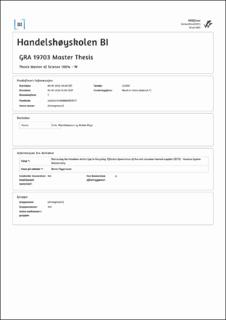| dc.description.abstract | This thesis explores the governance of the relationship between the end-consumer-turned-supplier (ECTS) and reverse logistics systems. Through an extensive review of literature, it is evident that the relationship between the ECTS and reverse logistics systems is flawed, resulting in suboptimal recycling behavior. The trust mechanism, which is predominantly prioritized, proves to be insufficient in effectively governing this relationship. The literature also highlights the significance of incorporating other control mechanisms such as price and authority for more balanced governance.
The thesis adopts a comprehensive methodology, including a thorough literature review, data collection from municipalities in Norway, and analysis of findings in conjunction with relevant literature. The research aims to contribute to the understanding of effective governance in the ECTS-reverse system relationship, offering insights and recommendations for sustainable waste management strategies.
The proposition put forward in this thesis emphasizes the need for a more effective governance approach to tighten the recycling behavior gap. Trust alone is not enough, and a balanced governance framework with increased utilization of price and authority mechanisms is necessary. By integrating a balanced utilization of price, authority, and trust, waste management systems can incentivize responsible behavior, ensure compliance, and promote positive attitudes towards waste reduction and recycling, ultimately contributing to sustainable waste management. Also, the role of material recycling rate in this thesis is used as an indicator of source sorting efficiency, indicating effective governance.
Furthermore, the thesis proposes two concrete measures for utilizing price and authority. Firstly, it suggests national standardizations and regulations, enhancing authority enforcement. Furthermore, an approach that empowers waste management actors, who are disadvantaged in this relationship, to have greater control and influence over the outcome, as manifested in the material recycling rate. Secondly, the thesis recommends implementing a Pay-As-You-Throw (PAYT) system as a strategy to incentivize the ECTS and address the increased CO2 fee. By linking waste disposal fees to the amount of waste generated, the PAYT-system encourages responsible behavior and source sorting. These measures contribute to a more effective and balanced governance approach, integrating price and authority mechanisms to drive sustainable waste management practices.
Overall, this thesis underscores the importance of a balanced governance approach and the utilization of multiple control mechanisms to enhance source sorting efficiency and promote sustainable waste management. By bridging the gap between recycling intentions and actions, the research aims to contribute to the development of more effective waste management policies and the pursuit of sustainable lifestyles. | en_US |
